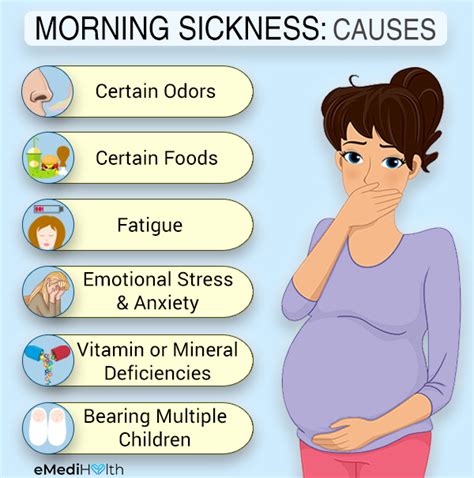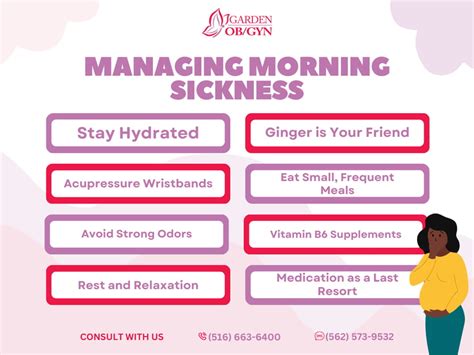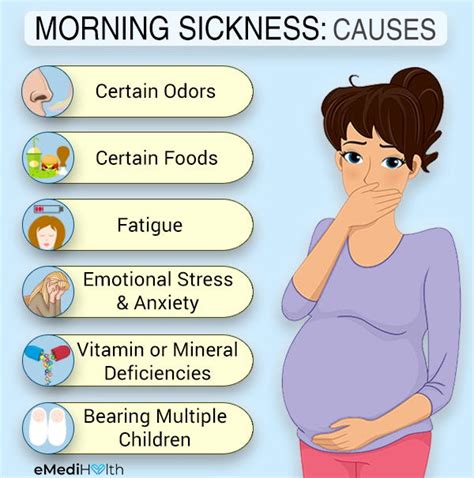Intro
Discover severe morning sickness symptoms, including nausea, vomiting, and dehydration. Learn about hyperemesis gravidarum, pregnancy complications, and relief options.
Morning sickness is a common phenomenon experienced by many women during the early stages of pregnancy. While it is often referred to as "morning" sickness, the symptoms can occur at any time of day and can be quite debilitating for some women. Severe morning sickness symptoms can significantly impact a woman's quality of life, making it essential to understand the causes, symptoms, and treatment options available.
For many women, morning sickness is a mild and temporary condition that resolves on its own by the 12th to 14th week of pregnancy. However, for some, the symptoms can be severe and persistent, lasting well into the second trimester. Severe morning sickness can lead to dehydration, weight loss, and electrolyte imbalances, which can have serious consequences for both the mother and the developing fetus. It is crucial for women experiencing severe morning sickness to seek medical attention to ensure they receive proper care and support.
The exact causes of morning sickness are still not fully understood, but it is believed to be related to the hormonal changes that occur during pregnancy. The rapid increase in estrogen and human chorionic gonadotropin (hCG) levels can affect the digestive system, leading to nausea and vomiting. Other factors, such as a sensitive stomach, stress, and fatigue, can also contribute to the severity of morning sickness symptoms. Understanding the underlying causes of morning sickness can help women take proactive steps to manage their symptoms and reduce their impact on daily life.
Understanding Severe Morning Sickness

Severe morning sickness, also known as hyperemesis gravidarum, is a condition characterized by persistent and severe nausea and vomiting during pregnancy. The symptoms can be so debilitating that they interfere with a woman's ability to eat, drink, and carry out daily activities. Severe morning sickness can lead to serious complications, such as dehydration, malnutrition, and electrolyte imbalances, if left untreated.
Symptoms of Severe Morning Sickness
The symptoms of severe morning sickness can vary from woman to woman but often include: * Persistent and severe nausea and vomiting * Vomiting blood or coffee ground-like material * Abdominal pain and cramping * Fever and chills * Dehydration and electrolyte imbalances * Weight loss and malnutrition * Fatigue and weakness * Mood changes, such as anxiety and depressionCauses and Risk Factors

While the exact causes of severe morning sickness are still not fully understood, several factors can increase a woman's risk of developing the condition. These include:
- A history of morning sickness in previous pregnancies
- Carrying multiple fetuses
- A history of motion sickness or other nausea-related conditions
- Hormonal changes and sensitivities
- Stress and anxiety
- Certain medical conditions, such as gastroesophageal reflux disease (GERD) or thyroid disorders
Diagnosing Severe Morning Sickness
Diagnosing severe morning sickness typically involves a physical examination, medical history, and laboratory tests to rule out other conditions that may be causing the symptoms. A healthcare provider may perform the following tests: * Urine tests to check for ketones and protein * Blood tests to check for electrolyte imbalances and liver function * Imaging tests, such as ultrasound, to check for any abnormalities in the fetus or placentaTreatment Options

Treatment for severe morning sickness typically involves a combination of lifestyle changes, dietary modifications, and medication. The goal of treatment is to manage symptoms, prevent complications, and ensure the health and well-being of both the mother and the fetus. Some common treatment options include:
- Dietary changes, such as eating small, frequent meals and avoiding trigger foods
- Rest and relaxation techniques, such as meditation and deep breathing
- Medications, such as anti-nausea medications and vitamins
- Hospitalization, in severe cases, to receive intravenous fluids and nutrition
Home Remedies and Self-Care
In addition to medical treatment, there are several home remedies and self-care strategies that can help manage severe morning sickness symptoms. These include: * Eating ginger or taking ginger supplements * Drinking plenty of fluids, such as water and electrolyte-rich beverages * Avoiding strong smells and triggers * Practicing good hygiene and sanitation * Getting plenty of rest and sleepManaging Severe Morning Sickness

Managing severe morning sickness requires a comprehensive approach that involves lifestyle changes, dietary modifications, and medical treatment. It is essential for women to work closely with their healthcare provider to develop a personalized treatment plan that meets their unique needs and circumstances. Some tips for managing severe morning sickness include:
- Keeping a symptom journal to track patterns and triggers
- Staying hydrated and eating small, frequent meals
- Practicing relaxation techniques, such as meditation and deep breathing
- Avoiding strenuous activities and getting plenty of rest
- Seeking support from family, friends, and support groups
Preventing Severe Morning Sickness
While it is not possible to completely prevent severe morning sickness, there are several strategies that can help reduce the risk of developing the condition. These include: * Maintaining a healthy weight and diet before pregnancy * Avoiding triggers, such as strong smells and certain foods * Practicing good hygiene and sanitation * Managing stress and anxiety through relaxation techniques * Getting plenty of rest and sleepConclusion and Next Steps

Severe morning sickness is a complex and debilitating condition that requires comprehensive medical care and support. By understanding the causes, symptoms, and treatment options available, women can take proactive steps to manage their symptoms and reduce their impact on daily life. If you are experiencing severe morning sickness, it is essential to seek medical attention to ensure you receive proper care and support.
What are the symptoms of severe morning sickness?
+The symptoms of severe morning sickness can include persistent and severe nausea and vomiting, vomiting blood or coffee ground-like material, abdominal pain and cramping, fever and chills, dehydration and electrolyte imbalances, weight loss and malnutrition, fatigue and weakness, and mood changes, such as anxiety and depression.
How is severe morning sickness diagnosed?
+Diagnosing severe morning sickness typically involves a physical examination, medical history, and laboratory tests to rule out other conditions that may be causing the symptoms. A healthcare provider may perform urine tests, blood tests, and imaging tests, such as ultrasound, to check for any abnormalities in the fetus or placenta.
What are the treatment options for severe morning sickness?
+Treatment for severe morning sickness typically involves a combination of lifestyle changes, dietary modifications, and medication. The goal of treatment is to manage symptoms, prevent complications, and ensure the health and well-being of both the mother and the fetus. Some common treatment options include dietary changes, rest and relaxation techniques, medications, and hospitalization, in severe cases.
Can severe morning sickness be prevented?
+While it is not possible to completely prevent severe morning sickness, there are several strategies that can help reduce the risk of developing the condition. These include maintaining a healthy weight and diet before pregnancy, avoiding triggers, practicing good hygiene and sanitation, managing stress and anxiety, and getting plenty of rest and sleep.
What are some home remedies for severe morning sickness?
+Some home remedies for severe morning sickness include eating ginger or taking ginger supplements, drinking plenty of fluids, avoiding strong smells and triggers, practicing good hygiene and sanitation, and getting plenty of rest and sleep. It is essential to consult with a healthcare provider before trying any home remedies, as they may interact with medical treatment or worsen symptoms.
If you or someone you know is experiencing severe morning sickness, it is essential to seek medical attention to ensure proper care and support. Share this article with others to help raise awareness about the importance of managing severe morning sickness and providing support to those affected. Leave a comment below to share your experiences or ask questions about severe morning sickness.
